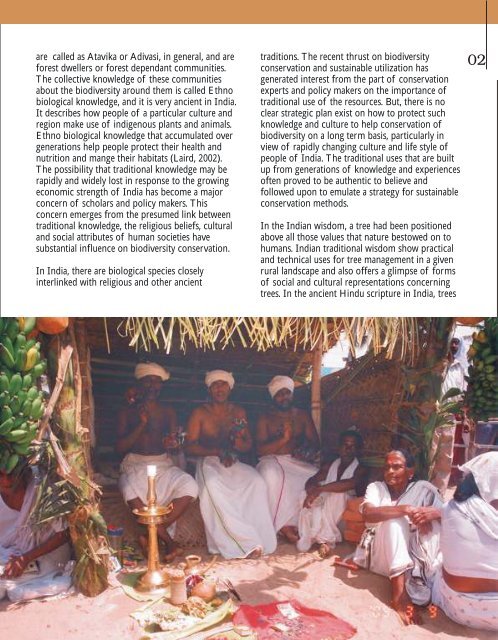Images - IUCN
Images - IUCN
Images - IUCN
Create successful ePaper yourself
Turn your PDF publications into a flip-book with our unique Google optimized e-Paper software.
are called as Atavika or Adivasi, in general, and are<br />
forest dwellers or forest dependant communities.<br />
The collective knowledge of these communities<br />
about the biodiversity around them is called Ethno<br />
biological knowledge, and it is very ancient in India.<br />
It describes how people of a particular culture and<br />
region make use of indigenous plants and animals.<br />
Ethno biological knowledge that accumulated over<br />
generations help people protect their health and<br />
nutrition and mange their habitats (Laird, 2002).<br />
The possibility that traditional knowledge may be<br />
rapidly and widely lost in response to the growing<br />
economic strength of India has become a major<br />
concern of scholars and policy makers. This<br />
concern emerges from the presumed link between<br />
traditional knowledge, the religious beliefs, cultural<br />
and social attributes of human societies have<br />
substantial influence on biodiversity conservation.<br />
In India, there are biological species closely<br />
interlinked with religious and other ancient<br />
traditions. The recent thrust on biodiversity<br />
conservation and sustainable utilization has<br />
generated interest from the part of conservation<br />
experts and policy makers on the importance of<br />
traditional use of the resources. But, there is no<br />
clear strategic plan exist on how to protect such<br />
knowledge and culture to help conservation of<br />
biodiversity on a long term basis, particularly in<br />
view of rapidly changing culture and life style of<br />
people of India. The traditional uses that are built<br />
up from generations of knowledge and experiences<br />
often proved to be authentic to believe and<br />
followed upon to emulate a strategy for sustainable<br />
conservation methods.<br />
In the Indian wisdom, a tree had been positioned<br />
above all those values that nature bestowed on to<br />
humans. Indian traditional wisdom show practical<br />
and technical uses for tree management in a given<br />
rural landscape and also offers a glimpse of forms<br />
of social and cultural representations concerning<br />
trees. In the ancient Hindu scripture in India, trees<br />
02

















